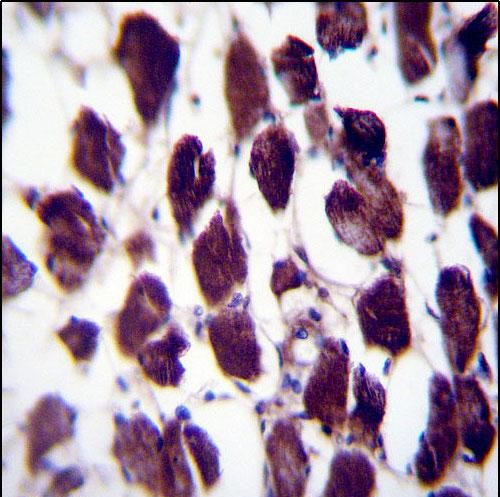



| WB | 1/1000 | Human,Mouse,Rat |
| IF | 咨询技术 | Human,Mouse,Rat |
| IHC | 1/100-1/500 | Human,Mouse,Rat |
| ICC | 1/10-1/50 | Human,Mouse,Rat |
| FCM | 1/10-1/50 | Human,Mouse,Rat |
| Elisa | 咨询技术 | Human,Mouse,Rat |
| Aliases | DNA polymerase subunit gamma-1, Mitochondrial DNA polymerase catalytic subunit, PolG-alpha, POLG, MDP1, POLG1, POLGA |
| Entrez GeneID | 5428 |
| WB Predicted band size | 139.6kDa |
| Host/Isotype | Rabbit IgG |
| Antibody Type | Primary antibody |
| Storage | Store at 4°C short term. Aliquot and store at -20°C long term. Avoid freeze/thaw cycles. |
| Species Reactivity | Human, Mouse, Rat |
| Immunogen | This POLG antibody is generated from rabbits immunized with a KLH conjugated synthetic peptide between 1120-1148 amino acids from the C-terminal region of human POLG. |
| Formulation | Purified antibody in PBS with 0.05% sodium azide. |
+ +
以下是3条与POLG抗体相关的参考文献,内容基于公开研究整理:
---
1. **文献名称**:*POLG mutations in neurodegenerative disorders with ataxia and epilepsy*
**作者**:Van Goethem G, et al.
**摘要**:研究分析了POLG基因突变与线粒体功能障碍导致的神经退行性疾病(如共济失调、癫痫)的关联,通过抗体检测POLG蛋白表达异常,揭示其在线粒体DNA复制缺陷中的作用。
---
2. **文献名称**:*The role of POLG antibodies in mitochondrial encephalomyopathies*
**作者**:Hudson G, Chinnery PF.
**摘要**:探讨POLG抗体在诊断线粒体脑肌病中的应用,通过免疫组化和Western blot技术验证POLG蛋白的缺失或异常表达,为疾病分型提供实验室依据。
---
3. **文献名称**:*Autoantibodies against DNA polymerase gamma in autoimmune neurological syndromes*
**作者**:Stiles AR, et al.
**摘要**:报道罕见自身免疫病例中抗POLG抗体的存在,提示此类抗体可能干扰线粒体功能,导致获得性神经肌肉症状,扩展了POLG抗体的病理意义。
---
如需具体文献全文或补充信息,建议通过PubMed或学术数据库检索DOI进一步获取。
POLG antibodies target the DNA polymerase gamma (POLG), a nuclear-encoded enzyme critical for mitochondrial DNA (mtDNA) replication and repair. POLG consists of a catalytic subunit (POLGα) and an accessory subunit (POLGβ), functioning as the sole DNA polymerase in mitochondria. Mutations in the POLG gene are linked to diverse mitochondrial disorders, including progressive external ophthalmoplegia (PEO), Alpers syndrome, and ataxia-neuropathy syndromes.
POLG antibodies are essential tools in research and diagnostics, enabling the detection of POLG protein expression, localization, and dysfunction. They help identify POLG-related pathologies by assessing protein levels in tissues or cultured cells, often via techniques like Western blotting, immunohistochemistry, or immunofluorescence. Additionally, these antibodies aid in studying the impact of POLG mutations on mtDNA stability, which is crucial for understanding disease mechanisms.
Clinically, POLG antibody-based assays support the diagnosis of mitochondrial disorders, especially when genetic testing reveals variants of uncertain significance. They also contribute to evaluating therapeutic interventions targeting mitochondrial dysfunction. However, interpreting results requires caution, as POLG expression can vary between tissues and disease stages. Overall, POLG antibodies bridge molecular insights into mitochondrial biology and their translational applications in managing genetic and degenerative diseases.
×